30+ Sample Dissertation Evaluation
-
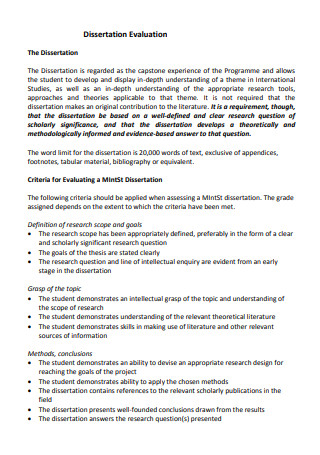
Dissertation Evaluation Template
download now -
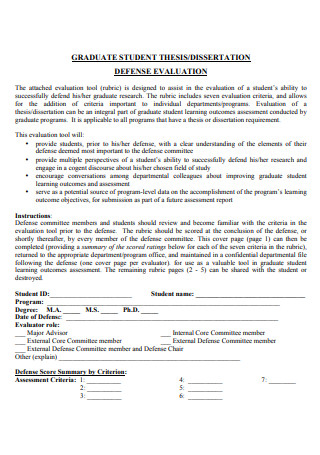
Dissertation Defense Evaluation
download now -
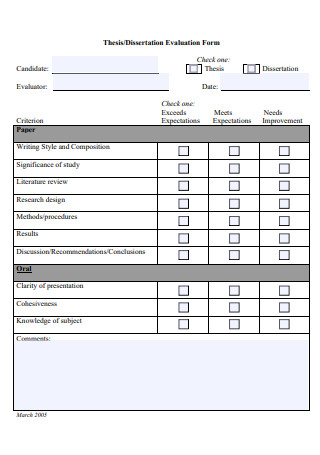
Dissertation Evaluation Form
download now -
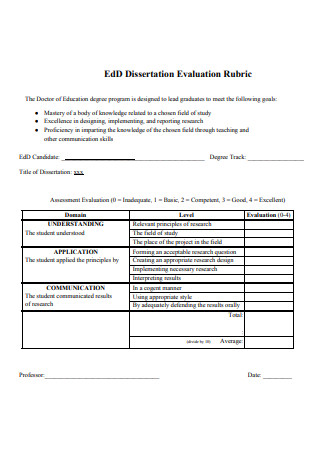
Basic Dissertation Evaluation
download now -
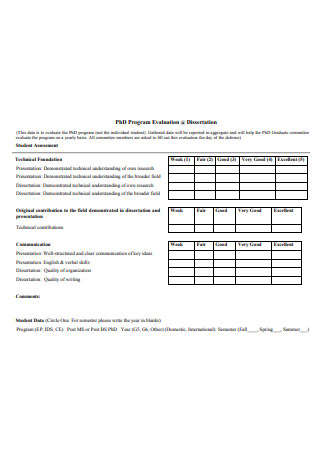
Dissertation Program Evaluation
download now -
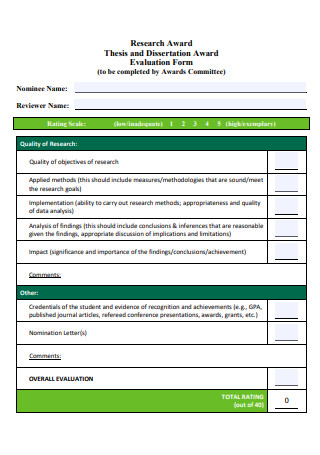
Dissertation Award Evaluation Form
download now -
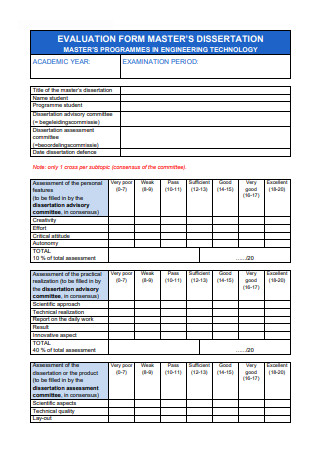
Master Dissertation Evaluation Form
download now -
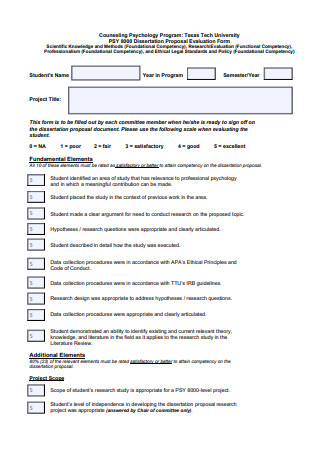
Dissertation Proposal Evaluation Form
download now -
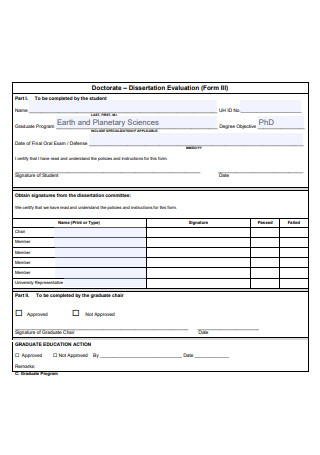
Doctorate Dissertation Evaluation
download now -
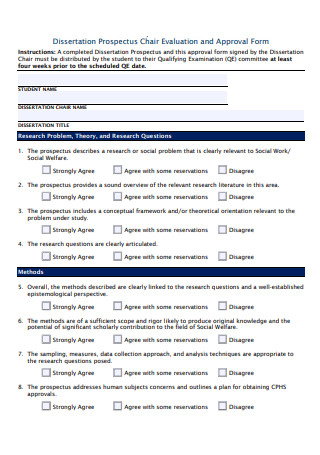
Dissertation Evaluation and Approval Form
download now -
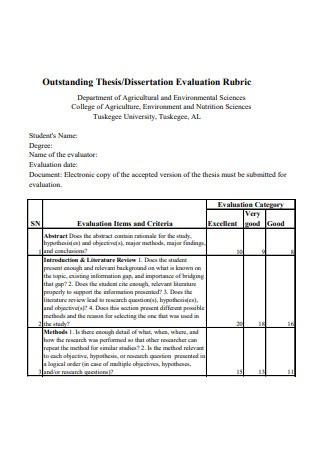
Outstanding Dissertation Evaluation
download now -
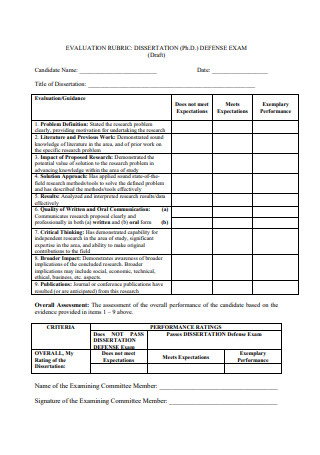
Dissertation Defense Exam Evaluation
download now -
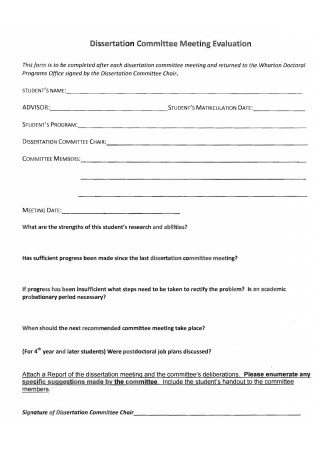
Dissertation Committee Meeting Evaluation
download now -
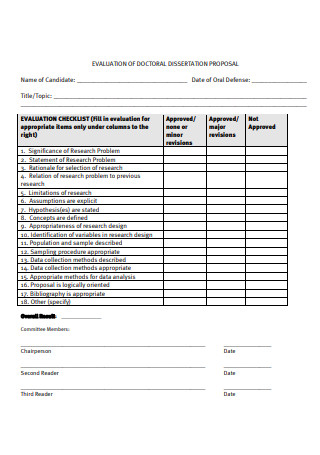
Doctoral Dissertation Proposal Evaluation
download now -
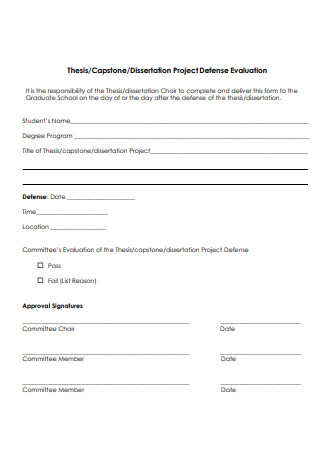
Dissertation Project Defense Evaluation
download now -
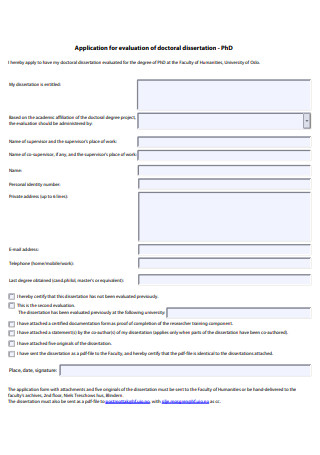
Doctoral Dissertation Application For Evaluation
download now -
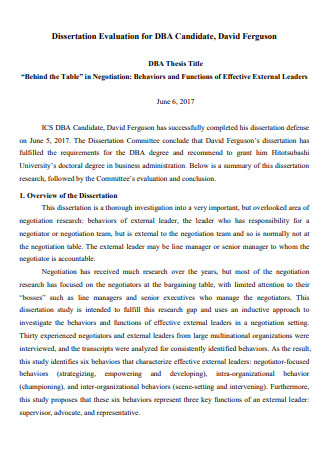
Candidate Dissertation Evaluation
download now -
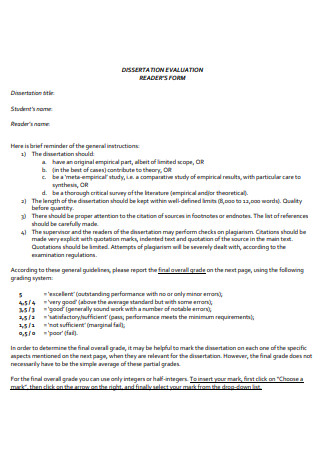
Dissertation Evaluation Reader Form
download now -
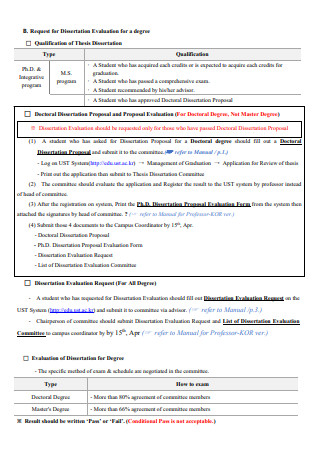
Degree Dissertation Evaluation
download now -
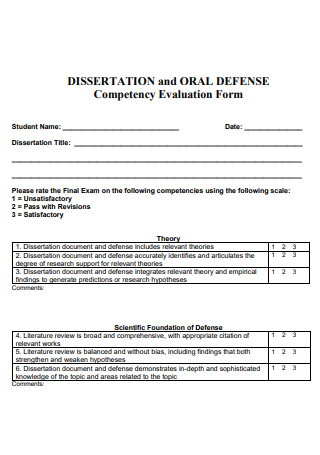
Dissertation and Oral Evaluation Form
download now -
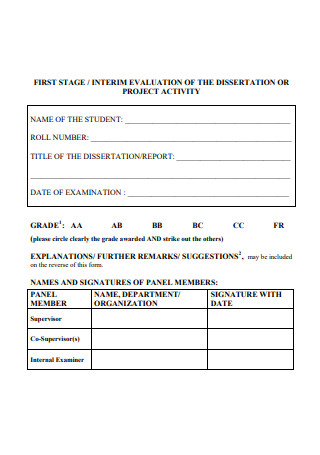
Dissertation Interim Evaluation
download now -
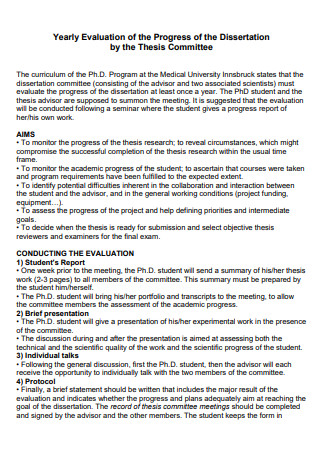
Dissertation Yearly Evaluation
download now -
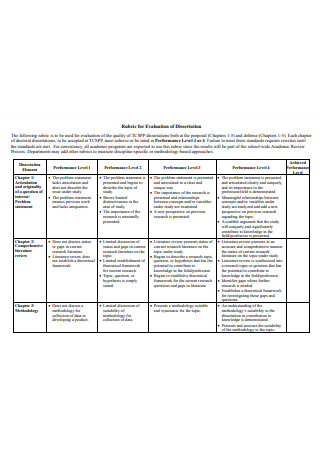
Dissertation Evaluation Example
download now -
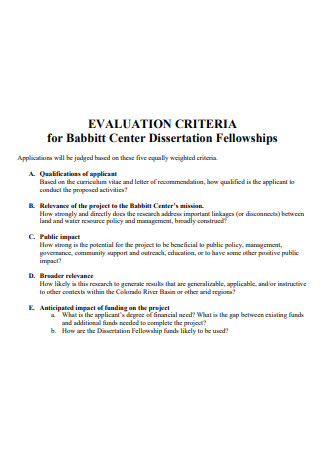
Center Dissertation Evaluation
download now -
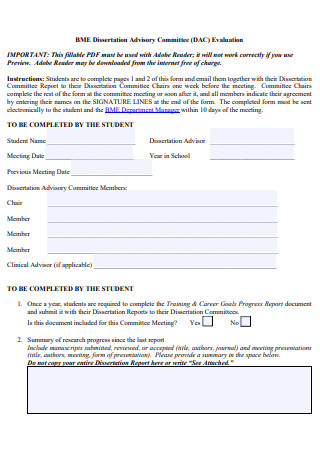
Dissertation Advisory Committee Evaluation
download now -
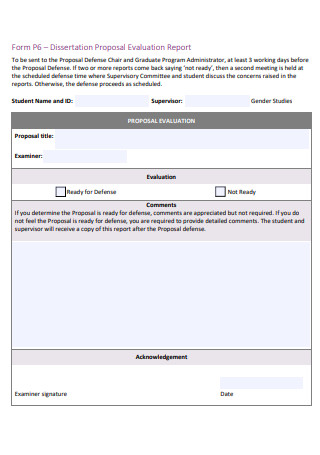
Dissertation Proposal Evaluation Report
download now -
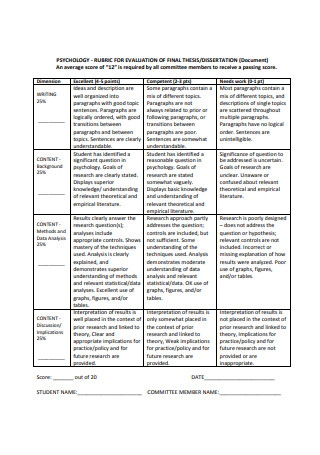
Dissertation Final Evaluation
download now -
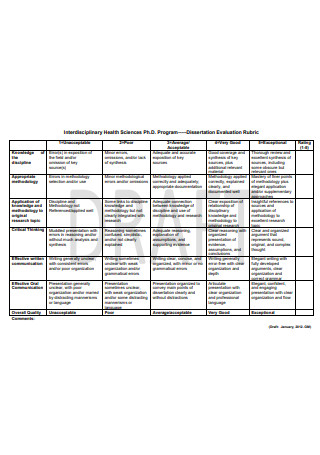
Draft Dissertation Evaluation
download now -
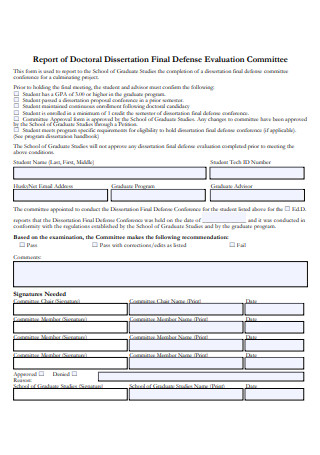
Printable Dissertation Evaluation
download now -
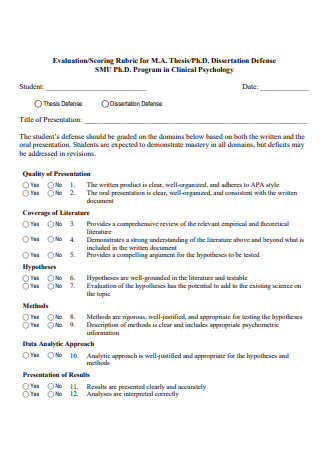
Dissertation Evaluation Format
download now -
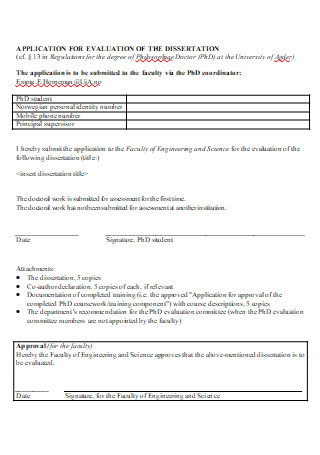
Dissertation Application Evaluation
download now
FREE Dissertation Evaluation s to Download
30+ Sample Dissertation Evaluation
What is a Dissertation Evaluation?
Different Types of Dissertation Evaluation
Benefits of Writing a Dissertation Evaluation
Basic Elements of a Dissertation Evaluation
How to Write a Dissertation Evaluation
FAQs
What are some examples of dissertation
What is the purpose of a dissertation evaluation?
What are the essential steps in writing a dissertation evaluation?
How to evaluate a dissertation?
What is a Dissertation Evaluation?
A dissertation evaluation is a systematic and critical document that illustrates a logical analysis of a graduate, masters, or doctoral student’s dissertation study. This is a comprehensive evaluation report which is created according to the diploma, graduate, master, or doctorate program policies of the university or graduate school, as well as the program and department that the candidate is affiliated with. Also, it is an efficient tool in measuring the level of relevance in research, clarity in methods being described, accuracy in data, precision in results and credibleness in references.
According to a 2016 study published by Journal of University Teaching & Learning Practice, among 120 dissertation study reviews in the sample, 25.8% received an overall rating of Sufficient/Acceptable. The reviewer highlighted every foundational error in the document, imparted general advice, and also offered specific advice within the context of the study, along with recommendations and resources if necessary. Thus, all types of novice and professional dissertation evaluators or reviewers should properly create an effective dissertation evaluation.
Different Types of Dissertation Evaluation
Dissertation reviewers are required to pinpoint foundational flaws and to provide useful feedback with the aim of improving quality. They play a key role in determining what specific work is deemed to contribute to the scholarly literature which assists authors in the refinement and advancement of the document. Plus it upholds standards of scientific quality. In this section, you will learn and understand about the different types of dissertation evaluation. To help you in this matter, we will introduce and explain to you about the different types of dissertation evaluation reports below:
1. Dissertation Program Evaluation
Program evaluation has three purposes which are evaluating program outcome and efficiency, analyzing program implementation issues, and examining or program planning and development. Summative evaluation is linked with evaluating program efficacy, efficiency, and effectiveness, with the goal of provisioning estimates of the program or service effects in terms of the impact to be anticipated at the inauguration of the program. While formative or process evaluation asks how, why, and under what conditions a particular program works. So, program evaluation is based on the development of a certain program logic model which contains both summative and formative elements, as well as quantitative and qualitative elements to be measured. Performing a thorough program evaluation of a dissertation study is beneficial because it has an added socio-political aspect as various agency administrators, staff, service users, and other stakeholders may all be affected on your dissertation study’s process and result.
2. Master Dissertation Evaluation
Doing a dissertation peer-review of a student having a master’s degree is crucial in helping them to acquire notable learning experiences. Some of the complex methods of conducting master dissertation evaluation are developing the ideas, adding feedback from the committee, working with the evaluation client, collecting and analyzing data, and facilitating utilization of the evaluation.
3. Doctoral Dissertation Evaluation
Are you curious in delving into the relative vulnerability of elderly nursing home patients with varying levels of family support? How is vulnerability defined and operationalized? How is family support determined and operationalized? How will these aspects be measured? Doctoral dissertation study commonly involves the measurement of abstract concepts, especially when conducting quantitative and qualitative research. Sample design, statistical power, effect size, sample selection in quantitative and qualitative research, and issues in measurement are some crucial elements in reviewing and evaluating the quality of doctoral dissertation study.
4. PhD Dissertation Evaluation
If you are a PhD student, you may also take a self-evaluation of your dissertation study. See if the title clearly identifies the main theme of the dissertation. Skim the introduction part and examine previous studies so that you are able to critically investigate and analyze the background and objective of the dissertation study. Then, check if the research methods are described in detail and if the data are shown accurately. Is there an academic value and potential contribution being implied in your dissertation?
Benefits of Writing a Dissertation Evaluation
Dr. Laura Leviton, the former president of the American Evaluation Association, stated in her presidential address about how evaluators failed to exercise good nontechnical skills and implored the evaluation community to not only address the technical elements of evaluation but the nontechnical elements as well. It is important to look for coherence, and relevance of the dissertation paper while evaluating it. So, what are the notable benefits of writing a well-detailed dissertation evaluation? Below are some of the primary benefits of writing a dissertation evaluation report for the graduate school:
1. Alerts for Possible Issues Before the Defense
If you are a dissertation evaluator, then writing an evaluation report for dissertation is definitely crucial to alert the dissertation head and other committee members concerning the possible issues that may arise before the defense . This will guide you to check and evaluate the content of the dissertation while recognizing common and diverging concerns when it comes to planning the defense. That’s why the evaluations may need additional discussion before the oral defense.
2. Supports Organized Decision Making
Critical evaluation of dissertations can be significantly useful in providing necessary data for organized decision making. Scientific method is broadly used in inferential evaluation. Thus, it is a methodical endeavor that can be utilized by many professionals like dissertation evaluators. It also assesses the value of a certain idea embedded in the dissertation study of the student. Faculty members of the evaluation committee develop holistic decisions about a dissertation rather than using some type of rubric or standardized checklist. However, having a standardized process of dissertation evaluation for document review might improve the quality. Thus, it can help in formulating vital conclusions.
3. Motivates Academic Growth and Development
Using a dissertation evaluation is beneficial as it motivates academic growth and development to the graduate students. The book Contemporary Approaches to Dissertation Development and Research Methods explained that evaluation provides a real world based approach for learning the rigorous research skills required for the eventual completion of a dissertation. It also allows many students to consider curriculums, programs, and policies, increasing the research options available to students depending on their personal interests.
4. Offers Sufficient Advice and Feedback
Creating dissertation evaluation reports is helpful in offering sufficient advice and feedback to the students. Reviewing or evaluating their dissertation study gives them a chance to ensure that they can create flawless final drafts while preparing for the submission. That’s why this practice can assist them in developing outstanding dissertations and elevating their dissertation writing skills that can help them to improve the quality of their work.
Basic Elements of a Dissertation Evaluation
In this section, you will learn how to construct a remarkably written and comprehensive dissertation evaluation report. However, a dissertation evaluation report has different parts. Include the following elements for you to create an excellent document:
How to Write a Dissertation Evaluation
Despite the challenges of assisting candidates to develop an acceptable and remarkable dissertation, you need to do your best effort in performing some critical evaluation of their dissertations. Below are some easy-to-follow tips that indicate how to design and write a professional dissertation evaluation:
Step 1: Observe the Theoretical Research Background and Problem
J. K. Rowling said: “A good first impression can work wonders.” That’s why the first impressions of dissertation reviewers are immensely affected by how he or she reads the initial part of the graduate student’s dissertation study. Write your initial judgment about the quality of a dissertation study early through careful observation and reading of theoretical research background. Skim the abstract, table of contents, and the entire introduction. Analyze the literature review of the dissertation so that you are able to resolve whether the student possesses awareness and familiarity with what they are performing.
Step 2: Read the Overall Content of Dissertation Study
Read the overall content of dissertation study when you are not stressed or exhausted like at early dawn after you wake up. Leaf through the material several times. Make sure that the dissertation fulfills your academic expectations and common standards. Look intently in the dissertation as you search if it is academically sound, engages well with the literature and carries a standardized methodology while being coherent, thought-provoking, and easy to grasp.
Step 3: Check for Possible Errors in a Balanced Manner
Are you distracted, and frustrated by repeated errors that could have been corrected easily in a particular dissertation work? Check for minor typographical or spelling errors, or check if the formatting or style is vague and contradictory. This will guide you to see the writing proficiency level of the dissertation owner. However, you need to examine the content of the dissertation apart from the errors in spelling, grammar, or punctuation usage.
Step 4: Develop a Comprehensive Evaluation
Look for coherence, accuracy, and precision in the student’s dissertation writing. The dissertation should demonstrate focus, flow, and a logical and clear-cut structure that integrates and connects the varying sections of the study. Did the student allocate some adequate time to analyze, interpret, categorize, order or apply the literature, critical in drawing brand new insights and conclusions? Determine if the student applies their approach carefully and inject some originality, and uniqueness. Scrutinize several charts, graphs, tables, and other visual diagrams that illustrate the presentation and interpretation of the results. Thus, develop a comprehensive evaluation of the dissertation.
Step 5: Proofread, Revise, and Prepare the Final Dissertation Evaluation Report
Check your overall dissertation evaluation. Indicate all the crucial elements in the dissertation evaluation. If you notice that you overlook some parts that require fundamental points, we recommend that you proofread and revise the document. After proofreading and revising, you can now prepare the final dissertation evaluation. Add some notes and other meaningful advice and other feedback you want to convey to the graduate student on the concluding part of your dissertation evaluation. Skim your dissertation evaluation report for final analysis and quality check.
FAQs
What are some examples of dissertation evaluation?
Some examples of dissertation evaluation are dissertation defense evaluation, dissertation program evaluation, dissertation award evaluation form, master dissertation evaluation form, dissertation proposal evaluation form, doctorate dissertation evaluation, dissertation committee meeting evaluation, doctoral dissertation proposal evaluation, candidate dissertation evaluation, degree dissertation evaluation, draft dissertation evaluation, and more.
What is the purpose of a dissertation evaluation?
The purpose of a dissertation evaluation is to analyze a particular dissertation’s overall content, structure, and layout. Doing this will help graduate students like you in enhancing the quality of your dissertation while creating an astonishing impact on your readers.
What are the essential steps in writing a dissertation evaluation?
Take some time to observe your own theoretical background of the research and present knowledge with literature. After that, critically review your entire dissertation work after the day you’ve completed the writing. Then, check for any missing sections. Compare your dissertation based on the outline you made in the beginning phases of your writing. Analyze several charts, graphs, tables, and other visual diagrams that illustrate the presentation and interpretation of the results. Lastly, proofread, edit, and revise the document if necessary.
How to evaluate a dissertation?
Develop a comparison of your work with the outline you made in the preliminary stages of your dissertation writing. Observe if all aspects, points, models, and theories have been covered. This will help you to get a clear idea of the overall content of your work and you might see some things that have been missed.
Henry Cloud said: “The natural response to evaluation is to feel judged. We have to mature to a place where we respond to it with gratitude, and love feedback.” Therefore, writing a clear and effective dissertation evaluation for your work as a graduate, Master’s, or doctorate student or as an academic evaluator is an integral process in alerting for possible issues before the defense, supporting organized decision making, motivating academic growth and development, and offering sufficient advice and feedback for quality improvement. So, here are some of our downloadable and printable sample dissertation evaluation reports available in different kinds of formats. Simply click the dissertation evaluation report templates in this article and start downloading now!
